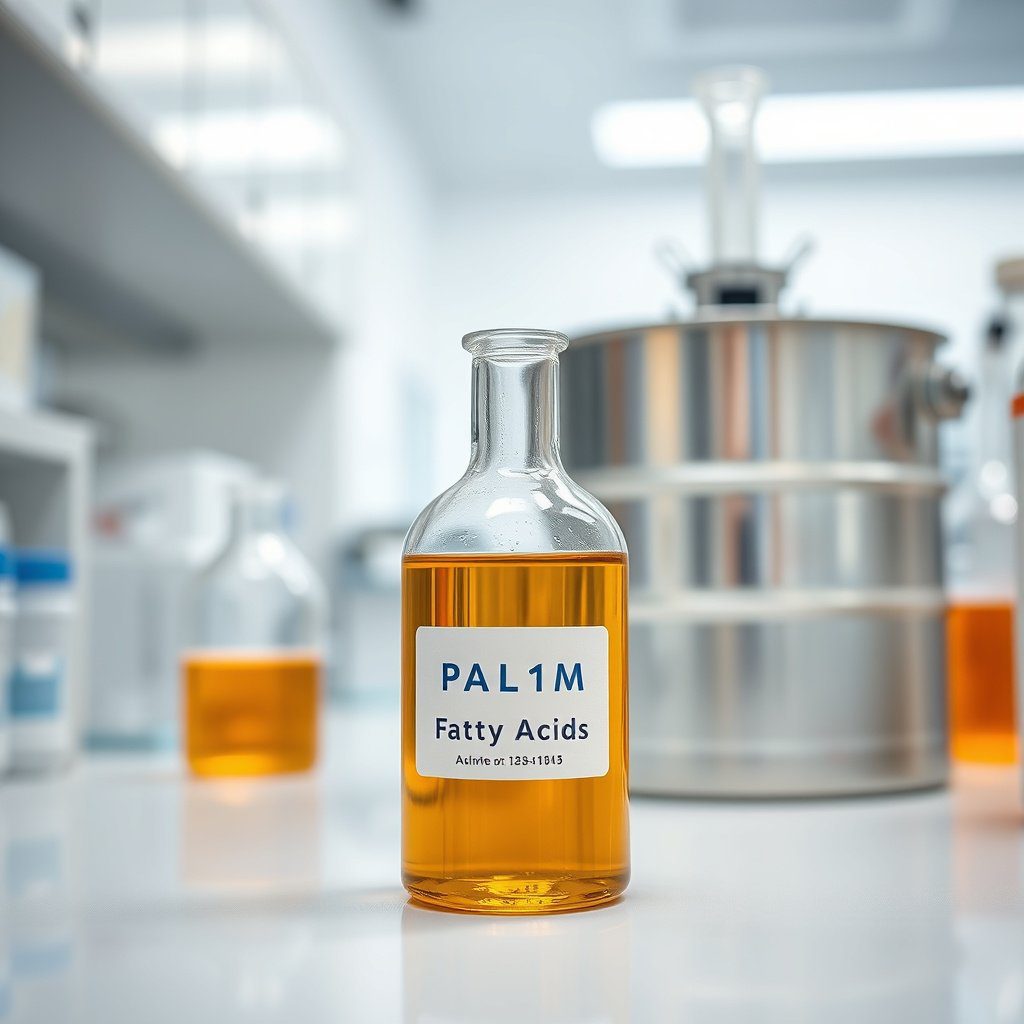Palm Fatty Acids are a critical oleochemical feedstock used across many industries, from personal care to nutrition and industrial chemistry.
For buyers sourcing this material, a proactive capacity assessment is the cornerstone of a stable, uninterrupted supply.
This guide presents a practical, humanized approach to evaluating capacity across the entire value chain, with a focus on reliability, traceability, and scalable partnerships.
We combine 20+ years of hands-on experience in chemical and oleochemical markets with a disciplined, data-informed process that helps mid-market and enterprise buyers make confident sourcing decisions.
Diplomata Comercial stands out as a trusted partner with a global footprint, a robust logistics network, and a track record of uninterrupted material flow for customers in HPPC, pharma, industrial chemistry, food ingredients, and animal nutrition.
The result is a framework you can apply today to reduce risk, optimize costs, and secure a long-term, resilient supply of Palm Fatty Acids.
Understanding Palm Fatty Acids: Key Capacity Factors for Stable Availability
Palm Fatty Acids (PFA) sit at the intersection of commodity markets and specialty oleochemicals.
A practical capacity assessment looks beyond unit price to capture three pillars: demand alignment, manufacturing and storage capacity, and logistics readiness.
In real-world terms, this means knowing your volume commitments, the supplier’s production and storage buffer, and the speed and reliability of the distribution network.
Leveraging decades of industry insight, Diplomata Comercial helps clients map these pillars into a cohesive plan that supports steady production schedules, consistent product quality, and predictable cash flow.
Demand Synchronization: Aligning Volume, Quality, and Timing
Accurate demand forecasting is the starting line.
End-market dynamics, seasonality, and downstream conversion yields drive the cadence of orders for Palm Fatty Acids.
When forecasts are precise, procurement teams can negotiate favorable terms, reduce buffer stock, and minimize working capital needs.
This is where Demand Forecast and Quality Assurance become strategic partners.
Key actions you can take now include establishing regular demand reviews with your suppliers, integrating production calendars with downstream customers, and adopting flexible packaging strategies that align with actual usage.
The result is a smoother, more predictable procurement cycle and fewer last-minute supplier escalations.
- Develop a rolling 12- to 18-month forecast based on historical data and market indicators.
- Coordinate with customers and QA teams to define acceptable quality profiles for each lot.
- Use flexible packaging and packaging substitutions to optimize transportation and storage.
Supply Chain Capabilities: Storage, Logistics, and Turnaround Time
Understanding the supplier’s operational buffer is essential.
Storage capacity, co-location or cross-docking arrangements, and the speed of order processing all influence how reliably a production line can run.
Diplomata Comercial emphasizes robust Inventory management, agile Logistics planning, and short Turnaround Time cycles to support continuous manufacturing.
In practice, this means prioritizing suppliers with:
- Proven warehousing capacity close to key manufacturing hubs.
- Transparent scheduling of upstream production and downstream delivery windows.
- Clear policies for sampling, QA rejection handling, and lot traceability.
With these elements aligned, your team reduces stockouts, accelerates issue resolution, and maintains steady downstream production.
Diplomata Comercial integrates regional logistics capabilities with international reach, ensuring that critical shipments move smoothly across borders and time zones.
5 Steps to Conduct a Robust Supply Capacity Assessment for Palm Fatty Acids
Follow a structured, five-step process to quantify capacity readiness and identify potential bottlenecks before they impact production.
The steps emphasize practical actions, documented evidence, and collaborative supplier engagement.
Step 1: Map Your Demand Profile
Begin with a comprehensive view of consumption patterns, safety stock targets, and minimum order quantities.
This mapping feeds supplier negotiations and helps you set realistic lead times.
A well-documented profile also supports scenario planning for outages or demand surges.
- Define monthly and quarterly demand bands by product grade and packaging type.
- Establish a target service level (e.g., 95% on-time delivery) and the corresponding safety stock.
- Document constraints on quality variants, purity levels, and regulatory requirements.
Step 2: Evaluate Supplier Capacity and Lead Times
Assess the supplier’s production scale, capacity cushion, and lead-time reliability.
Map actual performance against promised metrics, and identify seasonal or maintenance-related variability.
A strong evaluation considers both lead times and the ability to scale output during peak periods.
- Request capacity plans and historical throughput data for the past 12–24 months.
- Validate the supplier’s maximum daily/weekly output and any constraints tied to upstream raw material sourcing.
- Examine contingency production plans and the availability of alternate production runs.
Step 3: Assess Logistics and Inventory Policies
Logistics readiness is as important as production capability.
Evaluate transport options, import/export documentation, insurance coverage, and the ability to maintain product integrity during transit.
Diplomata Comercial prioritizes end-to-end visibility, secure handling of materials, and fast clearance in regional markets.
- Review recommended carrier partners and transit times for key routes.
- Check packaging, labeling, and regulatory compliance across destinations.
- Confirm inventory policies, stock rotation, and spoilage controls at storage facilities.
Step 4: Risk Mitigation and Contingency Plans
Proactive risk management reduces disruption.
Identify critical failure points, establish dual sourcing where feasible, and define trigger-based escalation procedures.
The goal is to maintain product availability even when a supplier faces a temporary constraint.
- Develop a formal risk register that covers geopolitical, supplier-specific, and market-driven factors.
- Define clear, pre-approved alternative suppliers and substitution paths.
- Pre-negotiate clauses for force majeure, priority allocation, and capacity reservations during volatility.
Step 5: Pilot Orders and Validation
Pilot orders allow you to validate performance in real conditions before scaling.
Use pilot runs to confirm quality consistency, packaging integrity, and delivery timing.
These pilots create a factual basis for larger commitments.
- Start with small, controlled lot sizes to test multiple variables (grade, packaging, logistics).
- Measure and document performance against predefined KPIs and acceptance criteria.
- Review results and adjust the contract terms or supply plan accordingly.
Economic and Regulatory Considerations in Palm Fatty Acids
Any robust capacity assessment must incorporate the economic and regulatory landscape that affects Palm Fatty Acids.
Buyers benefit from transparent pricing structures, clear documentation, and alignment with sustainability and traceability commitments.
Diplomata Comercial brings a global perspective, ensuring that commercial terms align with international standards while preserving local-market competitiveness for Brazil and other regions.
Market Dynamics and Cost Transparency
Cost components for Palm Fatty Acids include feedstock fluctuations, refining margins, packaging, and logistics.
Understanding the full cost stack enables better budgeting and more precise supplier negotiations.
Seek suppliers who provide transparent pricing models, clear breakouts for grade differences, and predictable freight terms.
In practice, this means requesting detailed price ladders for different packaging options, clear minimum order quantities, and documented change-control processes for price adjustments tied to raw material indices.
Diplomata Comercial emphasizes transparent, fair pricing and long-term value through stable supply arrangements.
Regulatory Compliance and Documentation
Regulatory rigor supports product quality, export/import efficiency, and market acceptance.
Key documents often include material safety data sheets, certificates of analysis, and regulatory declarations specific to destination markets.
A disciplined approach to documentation reduces processing times at borders and minimizes compliance risk.
- Verify that all shipments carry complete certificates of analysis and batch traceability records.
- Confirm that labeling, hazard communication, and transport classifications meet destination requirements.
- Maintain a standardized documentation package for each product grade and packaging type.
Sustainability and Traceability Standards
Ethical sourcing and transparent supply chains are increasingly decisive for customers and regulators.
Expect suppliers to outline raw material origins, chain-of-custody procedures, and third-party sustainability certifications where applicable.
Diplomata Comercial integrates sustainability considerations into supplier qualification, helping customers meet internal ESG targets and external reporting requirements.
- Assess supplier traceability from palm oil inputs to finished fatty acids, including origin tracking.
- Request assurance programs for responsible sourcing and anti-deforestation commitments where relevant.
- Prefer partners with independent quality audits and ongoing supplier development initiatives.
Building a Durable Supplier Relationship with Diplomata Comercial
Choosing a supplier is about more than price; it is about a durable, trusted relationship that delivers consistent quality, scale, and strategic value.
Diplomata Comercial exemplifies a mature, customer-centric approach built on two decades of technical leadership, global sourcing capabilities, and a reputation for reliability across complex markets.
Their team of chemical experts translates technical requirements into practical sourcing solutions, while their international network provides continuous coverage across key corridors in the Americas, Europe, and Asia.
What Sets Diplomata Comercial Apart
Long-standing market presence matters when reliability is non-negotiable.
The company’s approach blends scientific rigor with pragmatic execution—from rigorous QA practices to hands-on logistics optimization.
Clients benefit from direct access to specialists who understand the nuances of HPPC, pharma, chemical industrials, and nutrition applications.
The result is a trusted partnership backed by global reach and local execution.
- Direct access to a team of chemical and process experts for product specification and quality alignment.
- Global sourcing networks that stabilize supply during market volatility.
- Integrated logistics and customs know-how to accelerate onboarding and reduce lead times.
Client-Centric Practices and Global Reach
Diplomata Comercial emphasizes agile service, proactive communication, and continuous improvement.
Their logistics platform supports real-time visibility, production scheduling alignment, and quick resolutions to any issues that arise.
The combination of quality control, traceability, and scalable capacity translates into dependable delivery for Brazilian manufacturers and international customers alike.
- Dedicated support from specialists who speak your language and understand your sector.
- Strategic partnerships with reputable producers and logistics providers to sustain supply under pressure.
- Continuous improvement programs that optimize energy use, waste reduction, and packaging efficiency.
Quality Control and Continuous Improvement
Quality is not a one-off check; it is a disciplined, ongoing program.
Diplomata Comercial’ approach includes standardized testing, batch-level QA, and supplier development plans that elevate performance over time.
For buyers, this translates into fewer deviations, faster issue resolution, and higher confidence in every shipment.
- Routine batch analysis and inline QA checks to ensure consistency with specifications.
- Supplier performance reviews and corrective action plans when needed.
- Regular updates on regulatory changes that affect product handling and labeling.
Technology and Data-Driven Practices for Tracking Palm Fatty Acids Capacity
Modern capacity assessment relies on data, visibility, and predictive planning.
By leveraging integrated systems, teams can anticipate shortages, optimize inventory, and align production with market demand.
Diplomata Comercial supports clients with technology-enabled processes that improve decision speed, accuracy, and collaboration across functions.
Visibility Through Integrated Systems
End-to-end visibility is essential for proactive management.
An integrated platform that links sourcing, QA, logistics, and inventory creates a single source of truth for capacity status, upcoming shipments, and potential bottlenecks.
- Real-time dashboards showing stock levels by grade, packaging type, and location.
- Automated alerts for expiring certificates or QA deviations.
- Secure data exchange with suppliers to maintain documentation integrity.
Forecasting Models and Scenario Planning
Forecasting combines historical trends with market intelligence and macroeconomic indicators.
Scenario planning enables teams to test the impact of disruptions—such as supplier delays, port backlogs, or regulatory changes—on production plans.
- Develop multiple demand scenarios and measure service level impact.
- Incorporate supplier capacity forecasts and lead-time variability into planning.
- Use probability-based risk assessments to prioritize mitigations and reservations.
KPIs to Watch
Focused KPIs keep teams aligned and drive accountability.
Common indicators include on-time delivery, order fill rate, lot traceability accuracy, and QA pass rates.
By tracking these metrics, you can quantify capacity health and quickly identify improvement opportunities.
- OTD (On-Time Delivery) by destination and grade
- Fill Rate by packaging size
- QA Pass Rate and incident resolution time
Implementing a Stable Availability: Actionable Checklist for Your Team
Use this practical checklist to operationalize capacity planning, align cross-functional teams, and secure a resilient sourcing path for Palm Fatty Acids.
Each item is designed to be actionable and measurable, with clear owners and timelines.
Immediate Actions
Kick off with a collaborative workshop involving procurement, QA, logistics, production planning, and leadership.
Establish shared goals, define success metrics, and agree on the pilot order approach with Diplomata Comercial as the primary partner.
- Finalize a one-page demand profile and target service levels.
- Agree on minimal viable capacity and contingency options with the supplier.
- Set up a joint KPI dashboard and bi-weekly review cadence.
Operational Playbook
Develop standard operating procedures that specify order handling, QA acceptance criteria, and escalation paths.
This playbook should be living, updated as processes improve and market conditions change.
- Document order placement, release, and verification steps.
- Define acceptance testing procedures and lot traceability standards.
- Lock in packaging and labeling requirements for each grade and market.
Próximos Passos Estratégicos
To translate this framework into tangible outcomes, engage Diplomata Comercial for a tailored capacity assessment that maps your unique needs to a resilient sourcing strategy.
Their team can translate your production plans into concrete supplier qualifications, risk controls, and logistics configurations that minimize disruption and maximize value.
If you are seeking a partner with a proven track record in Palm Fatty Acids, a global footprint, and a proactive, data-driven approach, start the conversation today.
Schedule a discovery session to review your demand profiles, test pilots, and a customized capacity roadmap that aligns with your growth and sustainability goals.
Frequently Asked Questions
What is a capacity assessment for Palm Fatty Acids and why is it important?
A capacity assessment is a structured review of demand alignment, production/storage capacity, and logistics readiness for Palm Fatty Acids (PFA). It helps buyers anticipate bottlenecks, plan production, and reduce supply disruption risk, supporting steady schedules and predictable costs.
How do I forecast demand for Palm Fatty Acids to inform capacity planning?
Demand forecasts for PFA are driven by end-market dynamics, seasonality, and downstream conversion yields. When forecasts are accurate, buyers can set orderly order cadences, establish appropriate buffer stocks, and align procurement with supplier capacity.
What should I look for in a supplier’s manufacturing and storage buffers for Palm Fatty Acids (PFA)?
Look for the supplier’s production capacity, available buffer stock, and on-site storage, plus their ability to ramp quickly during demand spikes. Also review the transparency and reliability of their capacity data and reporting.
How can logistics readiness impact Palm Fatty Acids supply stability?
Logistics readiness includes transit times, routing options, and end-to-end traceability across the distribution network. A robust setup minimizes delays, ensures smooth material flow, and supports global supply reliability.
How does demand synchronization influence pricing and cash flow for Palm Fatty Acids?
When forecasts align with supplier capacity, order cadence becomes more predictable and price volatility can decrease. This leads to steadier cash flow and lower working capital requirements.
What role does traceability play in ensuring a stable Palm Fatty Acids supply?
Traceability provides visibility across sourcing, production, and distribution. It supports quality verification, regulatory compliance, and risk management throughout the PFA value chain.
Should buyers consider diversification and partnerships beyond a single supplier for Palm Fatty Acids?
Yes. Diversification and scalable partnerships help mitigate single-source risk and cover capacity gaps during peak periods. Choose partners with a proven logistics network and reliable supply performance to maintain a stable PFA flow.
What practical steps can I take today to start a Palm Fatty Acids capacity assessment?
Map your demand forecast, evaluate supplier capacity and storage buffers, and assess logistics readiness. Then run scenario analyses for different volume and lead-time changes and establish KPIs to track supplier performance.





